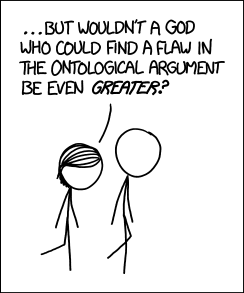Anselm and Aquinas
Posted: Wed, Sep 24, 2025
Background: The Arabic-Latin translation movements, Islamic philosophers exposing the Latin West to ancient Greek philosophy and profoundly shaping the medieval Christian world.
Two kinds of knowledge:
-
A priori: Can be justified without appealing directly to experience.
- Example: Freedom of speech includes a right to protest.
- The ontological argument seeks to demonstrate God’s existence a priori.
-
A posteriori: Cannot be justified without appealing directly to experience.
- Example: NYC’s waste management facilities are concentrated in communities of color.
- The cosmological argument seeks to demonstrate God’s existence a posteriori.
Anselm’s Ontological Argument
Reconstruct the core argument: Pp. 99–100.
For Anselm, God =df that than which nothing greater can be thought.
- God does not exist in reality. (According to the Fool)
- God exists in understanding. (Even for the Fool)
- Existing in reality is greater than existing merely in understanding.
- So, if God exists in understanding but not in reality, then it’s possible to think of something greater than God. (Implied by 3)
- So, it’s possible to think of something greater than God. (Follows from 1, 2, 4)
- But God is that than which nothing greater can be thought.
- Contradiction. (Follows from 5, 6)
- Therefore, reject 1: God exists in reality.
Reductio ad absurdum: P leads to absurdity; therefore, not P.
The crucial move: A perfect being’s essence implies its existence.
Gaunilo’s perfect island
Perfect Island =df that than which no greater island can be thought.
Anselm & Ibn Sina
God’s existence is necessary, not contingent: if God exists at all, he must exist necessarily.

xkcd comics: A God who holds the world record for eating the most skateboards is greater than a God who does not hold that record.
Aquinas’ Cosmological Arguments
Let’s focus on the first mover argument: P. 15.
- Some things are moved.
- Everything that is moved is moved by something else.
- This chain cannot go back forever.
- Therefore, there must be a first mover not moved by anything else.
- An unmoved first mover has to be God.
- Therefore, God exists.
Weak points:
- Against (2): Self-moved movement?
- Against (3): Can’t the chain go back forever?
- Eternal chain: Aristotle.
- Circular chain: A moved by B moved by C moved by A…
- Against (5): Does the unmoved first mover have to be God?
- Is the unmoved first mover all-powerful? all-good? all-knowing?